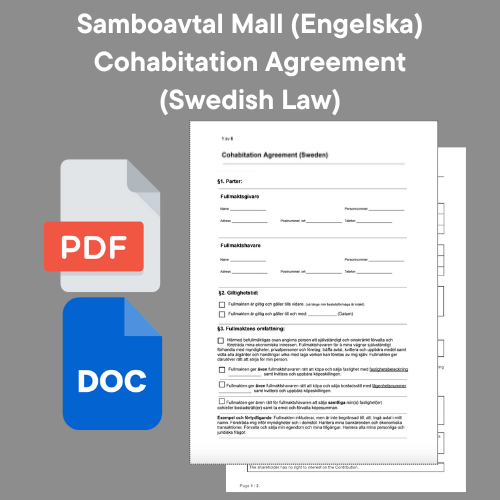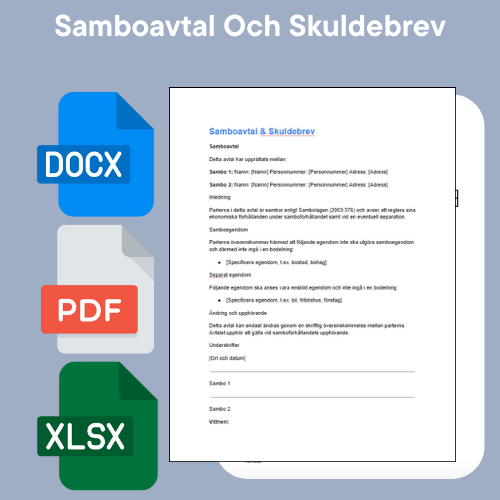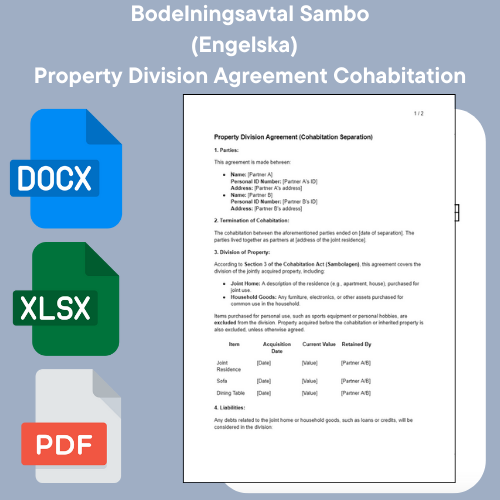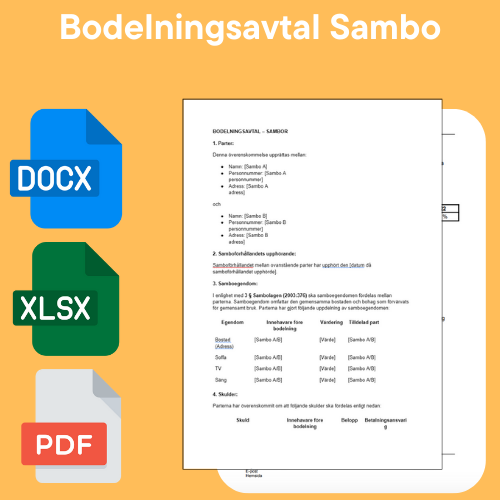Cohabitation Agreement Frequently Asked Questions (FAQ)
Share
Cohabitation Agreement Frequently Asked Questions (FAQ)
Table of Contents
- What does a cohabitation agreement mean?
- Why is a cohabitation agreement needed?
- Pros and cons of cohabitation agreements
- General considerations
- When drawing up the agreement
- Validity requirements for the document
- Frequently Asked Questions (FAQ)
- Additional Common Questions and Answers (FAQ) about Cohabitation Agreements
What does a cohabitation agreement mean?
A cohabitation agreement is a legal document drawn up between two people who live together in a cohabitation relationship. The agreement regulates how property is to be distributed between the cohabitants in the event of a separation. The purpose of the agreement is to override the rules that otherwise apply under the Cohabitation Act, especially regarding the division of cohabitation property such as joint housing and household goods.
Why is a cohabitation agreement necessary?
A cohabitation agreement is needed to create clarity and predictability in what should happen to the cohabitants' property in the event of a separation. Without a cohabitation agreement, the Cohabitation Act is applied, which can lead to shared housing and household goods being shared equally regardless of who has paid for them. The agreement can prevent conflicts and legal disputes by clearly defining ownership and distribution.
Pros and cons of cohabitation agreements
Advantages :
- Creates clarity and security.
- Prevents legal disputes in case of separation.
- Adapts the distribution of property according to the wishes of the cohabitants.
Disadvantages:
- It can be difficult to predict all future events.
- Can be experienced as an unpleasant or uncertainty-inducing process to discuss and draw up the agreement.
- Requires both parties to agree on the content.
General considerations
When considering a cohabitation agreement, it is important to discuss all aspects openly with your partner. Consulting a lawyer can be helpful to ensure that the agreement is fair and legal. It is also important to regularly update the agreement if conditions or assets change.
When drawing up the agreement
When a cohabitation agreement is drawn up, it should be in writing and signed by both parties. It is recommended that the agreement be witnessed by independent witnesses, although it is not a requirement for validity. It may also be wise for each party to have their own legal advice to ensure that the agreement is fair.
Validity requirements for the document
For a cohabitation agreement to be valid, it must be in writing and signed by both partners. It does not need to be registered or have any kind of official stamp, but being clear and correctly worded is important for its validity.
Frequently Asked Questions (FAQ)
When does a cohabitation agreement not apply?
A cohabitation agreement is not valid if it conflicts with mandatory legislation or if it is not in writing and signed by both parties.
What is not included in joint ownership?
Cohabitation property includes only joint housing and household goods acquired for joint use. Other assets, such as money, shares, cars or property acquired before the cohabitation began, are not included.
Do you need a cohabitation agreement when you live in a rental property?
It may be wise to have a cohabitation agreement even when living in a rental property, especially if there are other joint assets or if you want to clarify who has the right to the rental contract in the event of a separation.
Do you need to register a cohabitation agreement somewhere?
No, a cohabitation agreement does not need to be registered to be valid.
Is a stamp of authenticity required for a cohabitation agreement to be valid?
No, no stamp of authenticity is needed. A cohabitation agreement is valid as long as it is in writing and signed by both parties.
Are witnesses required for a cohabitation agreement?
No, witnesses are not required for a cohabitation agreement to be valid, but it can be an advantage to have witnesses to prove the agreement's authenticity.
Is a cohabitation agreement needed if different cash contributions have been paid?
Yes, it is particularly important to have a cohabitation agreement if the cohabitants have paid different amounts in cash for a joint home, to clarify how the distribution should take place in the event of a separation.
Can I keep the home if I have paid the entire purchase price and am alone on the loan?
It depends on whether there is a cohabitation agreement that regulates this. Without an agreement, the Cohabitation Act can mean that the home must still be divided equally if it was bought for joint use.
Is it possible to divide property other than the joint property?
Yes, cohabitants can agree to share other assets in addition to the cohabitation property, but this needs to be specifically regulated in the cohabitation agreement.
How does property division actually work, what is shared?
In the event of a separation, the joint property is divided, i.e. joint residence and household goods acquired for joint use. Other assets are not divided according to the Cohabitation Act.
How does the cohabitation law work in the event of a separation?
Co-ownership means that joint housing and household goods acquired for joint use must be shared equally in the event of a separation, unless otherwise agreed through a cohabitation agreement.
Can it happen that something is not shared even if we decided that everything should be shared?
Yes, if something is exempt from cohabitation property according to the law, or if there are special reasons that make another distribution considered more fair.
Do I still need to share something?
Yes, even with a cohabitation agreement there may be situations where certain property must be divided if it is considered cohabitation property under the Cohabitation Act.
Can you share everything, not share anything, or exclude certain specific things from sharing?
Yes, cohabitants can agree to share all property, not to share anything or to exclude specific things from sharing through a cohabitation agreement.
Can you be cohabiting even though you are registered at different addresses?
Yes, you can be cohabitants even if you are registered at different addresses, as long as you constantly live together and have a joint household.
Can cohabitation agreements protect my apartment?
Yes, a cohabitation agreement can make it clear that a certain apartment is not to be shared in the event of a separation, which provides some protection for the home.
Can cohabitants decide that they will inherit from each other?
No, cohabitants do not automatically inherit each other according to Swedish law. In order for cohabitants to inherit from each other, a will must be drawn up.
Can things acquired before moving in be shared in the division of property?
No, property that was acquired before cohabitation and that was not intended for joint use is not included in the division of property.
When will there be a division of property and who decides?
Property division takes place in the event of a separation if one of the cohabitants requests it within one year of the separation. It is up to the cohabitants themselves to decide if and when property division should take place.
As for the cohabitation law?
Partnerships apply when two people permanently live together in a couple relationship and have a joint household.
When are you cohabiting according to the Cohabitation Act?
You are cohabiting according to the Cohabitation Act when you permanently live together in a couple relationship and have a joint household.
Are cars, boats and holiday homes covered by the Cohabitation Act?
No, car, boat and holiday home are not covered by the Cohabitation Act's rules on cohabitation property.
What about cohabitation agreements and condominiums?
The cohabitation agreement can regulate who shall have the right to the right of occupancy in the event of a separation. Without an agreement, the rules of the Cohabitation Act apply that the condominium must be shared if it was acquired for joint use.
What happens if we no longer want to live together?
If the cohabitants no longer want to live together, they can either agree on the distribution of the cohabitation property themselves or request a division of property according to the Cohabitation Act.
What does property division mean?
Property division means that the joint property, i.e. joint residence and household goods acquired for joint use, is divided between the cohabitants in the event of a separation.
What is cohabitation?
According to Swedish law, cohabitants are two people who permanently live together in a couple relationship and have a joint household.
Additional Common Questions and Answers (FAQ) about Cohabitation Agreements
How does the cohabitation agreement affect the distribution of assets in case of separation?
A cohabitation agreement can specify how assets and liabilities are to be distributed in the event of a separation. It can include details of the distribution of real estate, furniture and other valuable assets, providing clarity and predictability for both parties.
Can you change or update a cohabitation agreement?
Yes, a cohabitation agreement can be changed or updated at any time as long as both parties agree and the changes are made in writing. It is important to review the agreement regularly, especially in the event of major changes in the living situation.
How does a cohabitation agreement affect inheritance and wills?
A cohabitation agreement does not directly affect inheritance rights because cohabitants do not inherit from each other by law. To ensure that the partner inherits, a separate will must be drawn up.
What happens if one of the partners dies?
If a cohabitant dies and there is a cohabitation agreement, the agreement applies to the distribution of the cohabitation property. However, matters of inheritance must be dealt with separately through a will.
What are the most common mistakes when drawing up a cohabitation agreement?
Common mistakes include not specifying all assets clearly, not updating the agreement when life circumstances change, and not seeking legal advice. These mistakes can lead to disputes and uncertainty in a separation.
How does a cohabitation agreement differ from a prenuptial agreement?
A cohabitation agreement only regulates cohabitants' joint residence and household goods, while a prenuptial agreement can cover all property that the spouses own. The prenuptial agreement must also be registered with the Swedish Tax Agency to be valid.
Do you need a cohabitation agreement if you do not have joint assets?
It can still be good to have a cohabitation agreement to clarify any future claims and avoid misunderstandings if property were to be purchased jointly in the future.
How much does it cost to draw up a cohabitation agreement?
The cost of drawing up a cohabitation agreement can vary depending on whether you do it yourself using templates or if you hire a lawyer. It is an investment that can save a lot of time and money in the event of a separation.
What is a shared property?
Cohabitation property is property acquired by cohabitants for joint use, which includes joint housing and household goods. Property acquired before the cohabitation relationship or for individual use is not included in the cohabitation property.
How does the cohabitation agreement affect joint debts?
A cohabitation agreement cannot directly regulate joint debts because the debts are personal. However, the agreement can clarify how the assets are to be distributed, which can affect the payment responsibility indirectly.
Can a cohabitation agreement be annulled?
A cohabitation agreement can be declared invalid if it does not meet the formal requirements, if it is considered unreasonable or if there is evidence that one of the parties was forced to sign the agreement.
These questions and answers provide a deeper understanding of the importance of having a cohabitation agreement and how it can affect cohabitants' financial and legal situation in the event of a separation. A well thought out and correctly drawn up cohabitation agreement is crucial to avoid conflicts and protect the interests of both parties.




